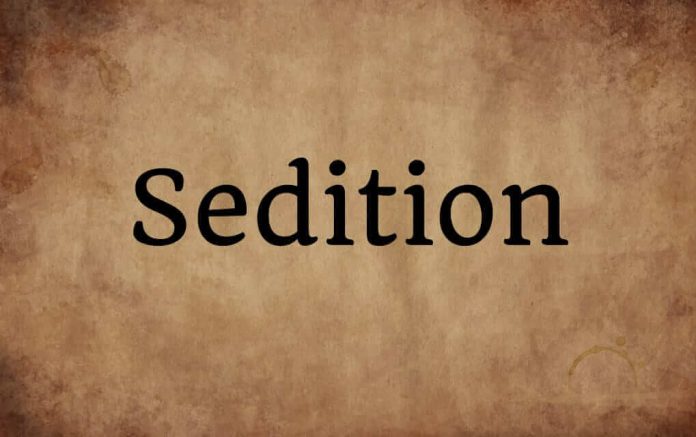This article has been written by Avirup Mondal, pursuing a Diploma in Advanced Contract Drafting, Negotiation, and Dispute Resolution, and edited by Shashwat Kaushik.
This article has been published by Sneha Mahawar.
Table of Contents
Introduction
The term ‘sedition’ means doing some act or using some words which incite people to go against the government authorities or the rule of law. This law was introduced by Britishers to counter the freedom of speech and expression in the colonial-era. Many freedom fighters or leaders like Subhas Chandra Bose, Mahatma Gandhi, and Bal Gangadhar Tilak were charged under the law of sedition. The conflict between sedition and freedom of speech has always been a topic of debate. It is said that politicians use sedition as a political tool to violate the right to freedom of speech. Article 19(1)(a) of the Constitution of India provides freedom of speech & expression, and it’s a fundamental right that cannot be taken away. In this article, we will discuss the conflict between Section 124A of the Indian Penal Code of 1860 and Article 19(1)(a) of the Indian Constitution. Further, we will also discuss if the sedition law introduced by Britishers is still needed in independent India or not.
Sedition law in India
Section 124A of the IPC defines sedition as an act “whoever by words, either spoken or written, or by any signs, or by visible representation, or otherwise, brings or attempts to bring into hatred or contempt, or excites or attempts to excite disaffection towards the Government established by law in India.”
This is a non-bailable offence, and punishment can go from 3 years to a lifetime and a fine. Anyone charged under this law will also be prohibited from working for the government, and their passport will be confiscated by the government.
Conflict between sedition and freedom of speech
The conflict between sedition laws and freedom of speech has been going on since the colonial-era. Britishers implemented this law to stop freedom fighters or leaders from speaking against them and reduce the threat against them. In 1837, Thomas Babington Macaulay drafted the sedition law, and in 1870, this law was introduced in India by James Stephen through an amendment. Since then, on multiple occasions, this law has violated the freedom of speech and expression of common people, and later it transformed into a political tool to prevent anyone speaking against them. Ironically, the sedition law has now been abolished by the UK, New Zealand, and Ghana. But in India, this law is still intact. According to the National Crime Records Bureau (NCRB) report, 76 sedition cases were filed in 2021. In numerous instances, journalists or media have also been charged under this law. Mere criticism should not be charged with sedition. In a democratic country, the value of freedom of speech and expression cannot be denied. Being able to express feelings freely makes a country truly democratic. But we should also keep in mind that the right vested in us under Article 19(1)(a) is not an absolute right and is subject to some restrictions. These restrictions are imposed to-
- Prevent the sovereignty and integrity of the country,
- to prevent incitement,
- to prevent hate-speech, etc.
Instances of conflict
- In the case of Vinod Dua vs. Union of India (2021),_ the Supreme Court dismissed a FIR against senior journalist Vinod Dua in Shimla, Himachal Pradesh, more than a year after local BJP officials had accused him of making disparaging remarks against Prime Minister Narendra Modi and the centre on his YouTube show. A bench made up of Justices UU Lalit and Vineet Saran said every journalist is entitled to protection under the Kedar Nath Singh case, which defined the breadth of the act of sedition under Section 124A of the IPC.
- On 13th February 2021, a 22 year-old climate change activist named Disha Ravi was detained under sedition for her relation with a “toolkit” for the farmer’s protest. Delhi Court issued her release order within one week of her arrest. According to Court the sedition cannot be used as a bandage for the government’s injured ego.
- Another important case is Tara Singh Gopi Chand vs. The State (1950), in this case the Punjab High Court held the sedition law to be constitutionally invalid because this law levied unreasonable restrictions on the freedom of speech and expression. This is an important case because it prompted the Jawaharlal Nehru led government to bring about reasonable restrictions to the freedom of speech and expression.
- In 2010, Dr. Binayak Sen, a civil rights activist, was found guilty of sedition and given a life sentence by a Chhattisgarh Court because he was found guilty of conspiring with the Naxals. He tried to create a network to combat the government. The Supreme Court granted him bail in 2011. The judge said it’s a democratic country, and Dr. Sen might be a sympathiser, but that does not make him guilty of sedition.
- In Kedar Nath Singh vs. State of Bihar (1962), the Supreme Court endeavoured to limit the potential for abuse of the sedition law while upholding its constitutional validity. The Court made it clear that criticism of the government cannot be classified as sedition unless it is an act or speech which disrupts public peace or initiates violence.
India is known as the biggest democratic country in the world. But in a democratic country, if freedom of speech is controlled by political agendas, it creates a disturbing image. In the 2022 press freedom index, India got 150th place out of 180 countries, but in 2023, India ascended to 161. The countries that occupied the first, second, and third positions are Norway, Finland, and Denmark, respectively. Sedition is not only a threat to freedom of speech; it is also a threat to democracy. It can be said that this law can be easily misused.
Does India still need sedition law of colonial-era
The sedition law was brought to India by the British just to oppress the Indians and prevent them from speaking against the government. You must have heard about Mr. Bal Gangadhar Tilak, now let me tell you an interesting fact about him. He was the first person to be held guilty of sedition in Colonial India. The British government charged him on account of his articles published in Tilak’s Marathi newspaper, Kesari. Mahatma Gandhi, Jawaharlal Nehru, and Bhagat Singh are some famous freedom fighters who were also held guilty under the sedition law. In 1962, the Supreme Court of India held this law to be constitutionally valid. Because without this law, the state would be in a complete state of chaos, and there would be no law to keep a check on the spread of hate or disorder against the state. The government needs to understand that criticism of government policy or the government itself is part of democracy. Misusing sedition to prevent people from expressing their point of view hurts the fundamental right of freedom of speech. Recently, in May 2022, the Supreme Court of India put a hold on this law and dropped all pending court trials under Section 124A of the IPC. The SC allowed the Union of India to review the colonial-era law. A three-judge bench led by the Chief Justice of India, Mr. N.V. Ramana instructed to keep all sedition charges in abeyance. The Supreme Court decided this to put a stop to misuse of the law. This is an appreciable step taken by the SC for the first time in the history of sedition law in India. This is the time we need to come out of the colonial-era’s abusive laws. This law is absurd because of its wrong usage to disturb freedom of speech and expression. Criticism always leads to growth. No one, whether media or common people, should be deprived of their freedom of expression because they criticise the government or its policies. Criticising national policy does not make someone anti national. It’s a mere portrayal of one’s thoughts or opinions on that policy, law, etc.
Conclusion
Sedition law and freedom of speech are a never-ending debate. But for the first time, it may come to an end if this law is dropped. But at the same time, we cannot ignore the importance of a nation’s security. This law should clearly mention that if someone tries to disturb public peace or incite violence, then only they should be punished under this law. Whether we need this law or not will always be a controversial matter. We just need to ensure that the fundamental right of being able to speak or express ourselves freely is not taken away by misusing sedition laws.
References
- https://www.thehindu.com/news/national/explained-indias-colonial-sedition-law-origins-govt-abuse-courts-take-on-it/article65375097.ece
- https://www.ndtv.com/india-news/from-kanhaiya-kumar-to-activist-disha-ravi-a-look-at-past-sedition-cases-2965686
- https://www.thehindu.com/news/national/Binayak-Sen-gets-bail-in-Supreme-Court/article14685491.ece
- https://www.google.com/amp/s/www.thehindu.com/data/data-the-worrying-state-of-press-freedom-in-india/article65384769.ece/amp/
- https://www.google.com/amp/s/www.thehindu.com/news/national/sc-asks-centre-states-to-not-file-fresh-firs-in-sedition-cases/article65403622.ece/amp/
Students of Lawsikho courses regularly produce writing assignments and work on practical exercises as a part of their coursework and develop themselves in real-life practical skills.
LawSikho has created a telegram group for exchanging legal knowledge, referrals, and various opportunities. You can click on this link and join:
Follow us on Instagram and subscribe to our YouTube channel for more amazing legal content.
 Serato DJ Crack 2025Serato DJ PRO Crack
Serato DJ Crack 2025Serato DJ PRO Crack











 Allow notifications
Allow notifications


